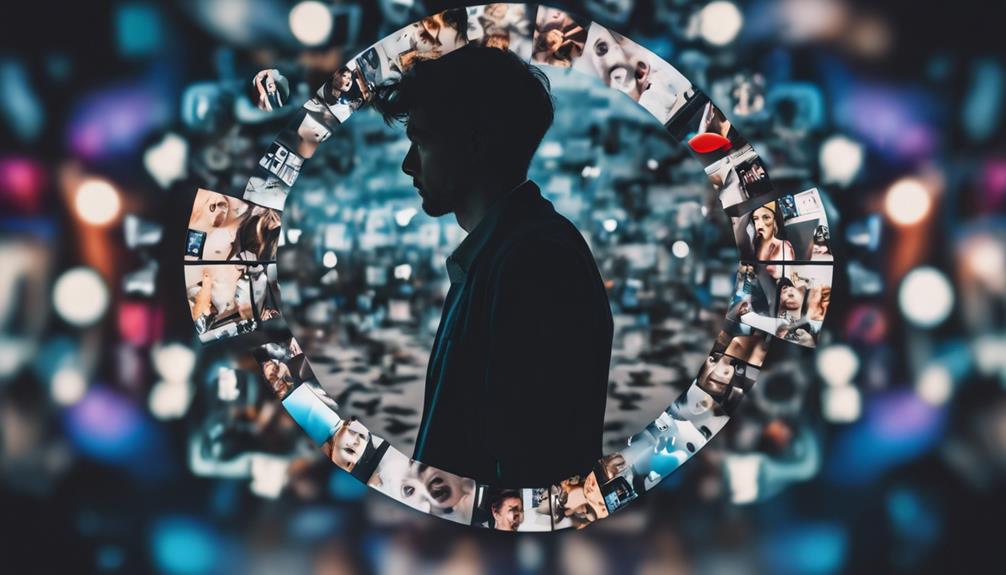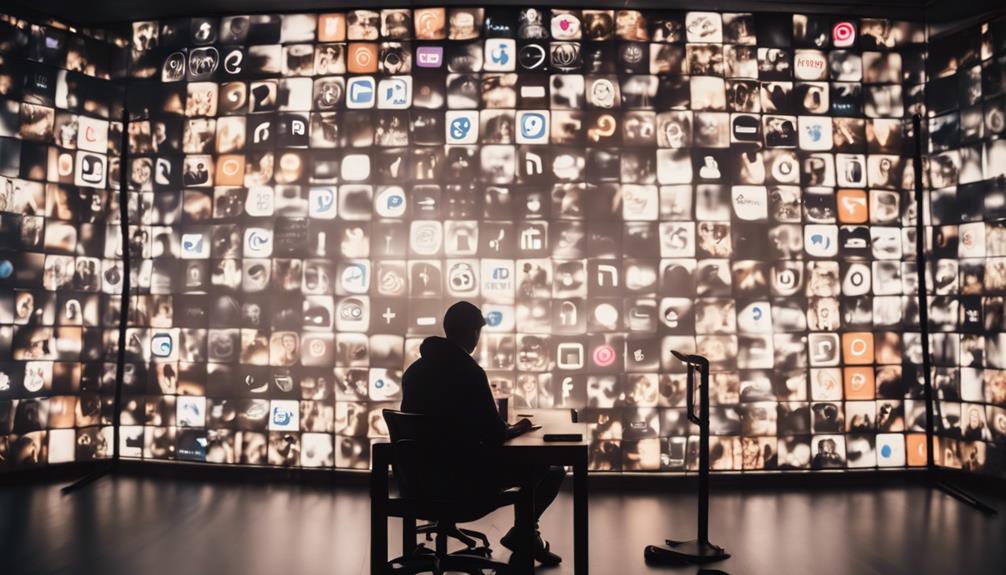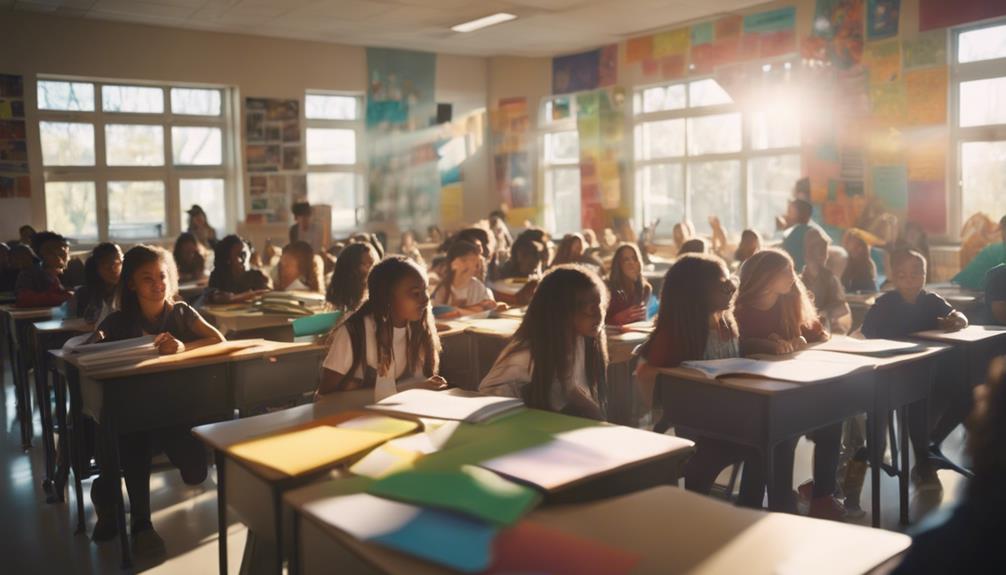Social media's hidden toll on society is more significant than you might realize. It fosters feelings of inadequacy and anxiety through constant comparison, impacting mental health. You may find yourself addicted, as likes and comments trigger your brain's reward system. This can lead to a decline in essential social skills, making real conversations feel challenging. The pressures of selfie culture and distorted realities further exacerbate self-esteem issues. While you might feel connected online, it often leads to loneliness. Understanding these effects can help you navigate social media more mindfully, and there's much more to uncover about your online experiences.
Key Takeaways
- Social media fosters feelings of inadequacy and anxiety, particularly among teens, leading to increased rates of sadness and hopelessness.
- Behavioral manipulation tactics create addictive patterns, making it difficult for users to disengage from social media platforms.
- The reliance on digital communication erodes essential social skills, resulting in loneliness and difficulty in forming meaningful relationships.
- Selfie culture pressures individuals to seek validation online, distorting self-worth and contributing to body image issues and mental health concerns.
Mental Health Challenges
Social media can significantly impact your mental health, fostering feelings of inadequacy and anxiety through constant comparison and unrealistic standards. You might find yourself scrolling through curated images that showcase seemingly perfect lives, which can lead to distress and dissatisfaction.
Research shows over 50% of teen girls reported persistent sadness or hopelessness, often linked to social media's influence. As you compare yourself to others, your self-esteem may plummet, especially if you're part of a marginalized community.
This unhealthy obsession with online validation can exacerbate body image issues and even contribute to eating disorders. Recognizing the weight of these pressures is vital, as understanding their effects can help you navigate your social media experiences more mindfully and improve your mental well-being.
Addiction and Behavioral Manipulation
The pressures of social media not only impact your mental health but also create a cycle of addiction fueled by behavioral manipulation tactics designed to keep you engaged and seeking validation.
You find yourself scrolling endlessly, drawn in by personalized content that triggers your brain's reward system. Each like or comment becomes a hit of dopamine, reinforcing the behavior and making it hard to step away.
This constant need for approval leads to spending over two hours daily on these platforms, affecting your well-being.
Recognizing these manipulative designs is crucial. By understanding how social media exploits your vulnerabilities, you can regain control over your online habits and mitigate its negative effects, helping to break free from this cycle of dependency.
Erosion of Social Skills

Increased reliance on digital communication diminishes your ability to develop essential social skills, making face-to-face interactions feel increasingly daunting.
You might find it challenging to engage in conversations or understand non-verbal cues, leading to awkward silences or misunderstandings.
As you spend more time online, your capacity for empathy and active listening can weaken, which ultimately hampers your ability to form meaningful relationships.
This lack of real-world interaction can foster feelings of loneliness and social disconnection, making it difficult to navigate complex social situations.
If you continue to prioritize digital chats over in-person connections, you'll likely struggle to build and maintain healthy relationships, leaving you feeling isolated in a world that's more connected than ever.
Impact of Selfie Culture
Relying heavily on digital communication can make you more susceptible to the pressures of selfie culture, where constant self-comparison and validation-seeking behaviors thrive. You might find yourself scrolling through endless feeds of curated images, feeling inadequate as you measure your appearance against filtered perfection.
This culture can lead to unhealthy obsessions with how you present yourself online, often prioritizing likes and comments over genuine self-worth. The pressure to maintain an idealized persona can create significant stress, affecting your mental health.
You may also notice a decline in self-esteem as you chase unattainable beauty standards, which can exacerbate feelings of loneliness and anxiety. Recognizing these patterns is the first step toward breaking free from selfie culture's grip.
Distorted Reality and Expectations

Social media skews your perception of reality, as curated feeds filled with idealized images create unrealistic expectations for yourself and your life.
You may find yourself constantly comparing your day-to-day moments to the highlight reels of others, leading to feelings of inadequacy and dissatisfaction. The prevalence of filtered selfies and staged lifestyles distorts what you believe is normal, pushing you to chase unattainable standards.
This pressure can amplify stress and anxiety, making you feel like you're never enough. As you scroll through these images, it's easy to forget that they often represent a fabricated reality, not the everyday struggles everyone faces.
Recognizing this distortion is crucial in reclaiming your self-worth and fostering a healthier mindset.
Loneliness in a Connected World
Despite being constantly connected online, you might find yourself feeling more isolated than ever.
Social media creates an illusion of connection while often undermining genuine relationships. You might scroll through feeds filled with curated lives, yet feel a deep sense of loneliness that seems to grow.
The time spent online can replace real-world interactions, diminishing your social skills and making it harder to form true connections. You may struggle to engage in meaningful conversations, as digital communication lacks the nuances of face-to-face interaction.
This reliance on screens can lead you to overlook opportunities for authentic bonding, further deepening your sense of isolation. In a world that promotes connectivity, the emotional distance can feel overwhelming and disheartening.
Strategies for Healthier Engagement

To foster healthier engagement with social media, you can start by setting clear boundaries on your usage and prioritizing real-life connections.
Limit your screen time by scheduling specific hours for social media and turning off notifications outside those times. Engage in hobbies that inspire you and cultivate relationships offline. This not only enhances your social skills but also fills your life with fulfilling experiences.
Practice mindfulness to stay aware of your emotions while using social media, helping you recognize when it's becoming overwhelming.
Lastly, remember that it's okay to take breaks; stepping back can provide clarity and improve your overall mental well-being.
Frequently Asked Questions
How Can Parents Monitor Their Children's Social Media Use Effectively?
To effectively monitor your children's social media use, set open communication about online activities, establish clear guidelines, use parental control tools, and encourage regular discussions about their experiences and feelings related to social media interactions.
What Role Do Influencers Play in Shaping Social Media's Negative Impacts?
Influencers often set unrealistic standards, promoting curated lifestyles and appearances that can distort your self-image. By constantly comparing yourself to them, you might feel inadequate, which negatively impacts your mental health and self-esteem.
Are There Specific Demographics More Affected by Social Media's Toll?
Certain demographics, like young women and marginalized communities, are more affected by social media's toll. You might experience increased feelings of inadequacy and anxiety, highlighting the need for awareness and healthier online engagement. These hidden challenges of growth can manifest in comparison and competition with others, leading to a vicious cycle of self-doubt and negative self-talk. It’s important to cultivate a mindset that promotes self-compassion and self-acceptance, and to seek support from trusted individuals or professionals when needed. By acknowledging the impact of social media on our mental health, we can work towards creating a more positive and empowering online environment for all users.
How Does Social Media Impact Academic Performance Among Students?
Social media can distract you from studying, leading to lower academic performance. Constant notifications and the urge to check updates interrupt focus, making it harder to retain information and complete assignments effectively.
What Resources Are Available for Those Struggling With Social Media Addiction?
If you're struggling with social media addiction, consider seeking support from counseling services, online support groups, or mental health apps. Setting boundaries and engaging in offline activities can also help you regain control and improve well-being.
Conclusion
In conclusion, it's crucial to recognize the hidden toll social media can take on your mental health and overall well-being. Understanding the dark side of social media, such as the pressure to present a perfect image and the negative effects of comparison, can help individuals navigate these platforms more mindfully. It’s important to prioritize real-life connections and self-care practices to counteract the potential negative impact of social media. By being aware of these hidden tolls and taking proactive steps to protect your mental health, you can use social media in a way that enhances your life rather than detracts from it.
By understanding its impacts, you can take proactive steps to cultivate healthier online habits.
Remember to prioritize real-life connections and set boundaries for your digital interactions.
Embrace authenticity over curated perfection, and don't hesitate to seek support if you're feeling overwhelmed.
By finding balance, you can enjoy the benefits of social media without sacrificing your mental health.










